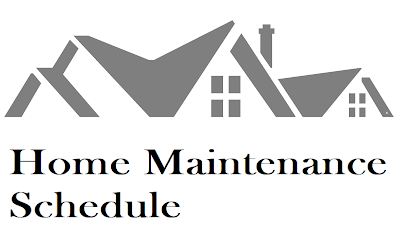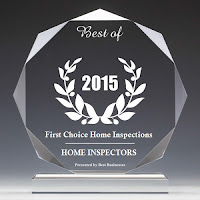Florida Home Inspector’s Home Maintenance List
You should not fool yourself, home
maintenance is work and must be completed to keep your home in top shape and
prevent extensive and expensive repairs in the future. Whether you complete the task yourself or
hire a professional to complete them; it is imperative the maintenance is
completed in a timely manner.
Carrying out your monthly maintenance helps your home’s curb
appeal and keeps your home safe and sanitary. Completing monthly, seasonal and
annual tasks helps prevents damage to your home. It also helps to maintain or
even increase your home’s real estate market value.
Completing your maintenance list will save you money on
repair bills of your home’s systems and appliances. You can customize your home
maintenance list to suit your home and accommodate your schedule. You can print the list and have it laminated,
use an app on your phone, add the items to your calendar or have an annual home checkup inspection by a licensed home inspector.
Ensure the task is within your level of experience or
comfort. Google or research the task for
additional information and step by step instructions. Never attempt a task that makes you
uncomfortable. Safety is the top
priority when doing home maintenance.
Use the appropriate safety equipment; like wearing gloves and a face mask
when undertaking certain tasks.
If you need to hire a professional, try to plan the work
when the season is slow;
- Air conditioning / HVAC – late winter to early spring, avoid summer.
- Roofing – winter to early spring, avoid summer or rainy season.
- Chimney sweep – spring to summer, avoid fall and winter months.
- Arborist / Tree service – winter months, avoid hurricane season.
- Painters – winter to spring, avoid rainy season.
Monthly Home Maintenance Tasks
- Check smoke detectors and carbon monoxide alarms and ensure you meet the minimum local requirements for these devices.
- Test all GFCI outlets.
- Test AFCI, GFCI and combination breakers. Ensure sensitive electronic equipment is turn off before testing.
- Remove the lint screen from the dryer lint trap and vacuum inside the trap. Clean the lint screen with hot water and dish soap then air dry. When clean, the screen should allow water to freely pass through the screen.
- Clean oven hood filters.
- Change your air conditioning filter(s).
- Clean kitchen and bathroom drains and remove hair and debris. Clean drain traps with equal parts of vinegar and baking soda.
- Clean the garbage disposal with frozen lemons or cut wedges of any citrus fruit to remove odors. Remove the baffle or splash guard and clean with soap and water.
- Check the water softener and filtration systems; replace filters and replenish salt.
Quarterly Maintenance
 |
| Detached and damaged tabs |
- Check your roof from the ground with binoculars for storm damage. You should have a professional roof inspection every two years for routine roof maintenance.
- *Clean the gutters of leaves and other debris. Check loose or missing gutter spikes or straps. Downspouts should be secure and drain water away from your home. Check joints and downspouts for damage or leaking.
- Check faucet aerators and showerheads for mineral buildup. Clean with CLR, Lime-Away or similar product.
- Check doors, hinges, rollers, locks and knobs for deterioration or looseness. Door should open, close and latch smoothly.
- Open and close all windows. Repair or replace any damaged balance springs and window hardware.
- Carefully clean / vacuum refrigerator coils to remove dust to allow appropriate air flow. Clean the drip pan, if equipped.
- Check supply and drain plumbing under your sinks for leaks or corrosion.
Spring Maintenance
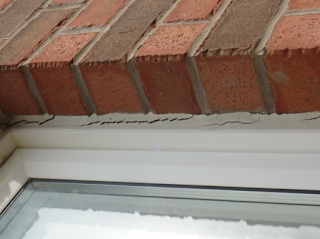 |
| Dried out, cracked caulking. Remove and replace. |
- *Clean your exterior siding with an appropriate outdoor siding cleaner. Avoid high pressure washing as it can damage stucco, wood and even mortar between bricks. For algae, mold and mildew select a cleaner with bleach or vinegar.
- Check your siding for cracks or moisture damage. Stucco cracks under ¼” should be filled and sealed. Over ¼” consult a licensed contractor. Moisture damaged wood should be repaired or replaced.
- Caulk around windows and doors to prevent air leakage. Remove and replace any dried and cracked caulking.
- Touch up exterior paint on siding and trim.
- Replace smoke detector batteries.
- Check and replace hurricane supplies.
- Clean and repair window screens.
- Clean and inspect wood deck for loose boards and damage. Replace any damaged wood. Reseal or paint before summer rains.
- Inspect your generator and lawn equipment for proper operation. Replace any worn hoses, belts, filters or plugs. Have all repairs completed before the summer rains or hurricane season.
Summer Maintenance
- Fill and seal cracks in your concrete driveway and sidewalks. Patch damaged asphalt driveways.
- Check washing machine, refrigerator, dishwasher and hoses, risers and tubing. A burst hose or riser could cause your home to flood. Look for signs of worn or damaged hoses, leaks or corroded risers and tubing.
- Check the fireplace for damage and have the flues professionally cleaned and examined.
- Check all bathroom and kitchen caulking and grout. Clean, repair and seal your tile grout.
- Check and repair all leaking faucets and hose bibs.
- Check and lubricate the garage door wheels and hinges. Check the garage door opener and hardware are in proper working order.
Autumn Maintenance
- Check and replace damaged weather stripping around doors and windows. Check the insulation on the low pressure line on your outside air conditioning unit.
- Check the smoke detector date on the back. Replace smoke detectors over 10 years of age and with no date. Replace smoke detector batteries.
- Check and repair your home’s siding and trim for any damage or wood rot.
Winter Maintenance
 |
| Raccoons in attic are dangerous and should be professionally removed. |
- *Check your soffits for any damage. Raccoons and squirrels will be looking for a nesting site and can damage attic insulation and electrical wiring. Squirrels nesting season is February and August. Nesting season for raccoons is usually in March. If you suspect or hear raccoons in the attic, call a professional wild life removal specialist, like Affordable Wildlife Removal to humanely remove and relocate the raccoon and kits.
- *Check your trees for any dead or damaged branches. Trim tree branches within 5 feet of your home to prevent damage to your home or roof. Pay attention to the ground around the trees and look for any signs of root uplift. Hire an arborist to remove any high limbs, limbs near your home or to evaluate dark staining, holes or sap on the trunk of the trees.
- Change the oil in your generator and lawn equipment. Drain any remaining fuel from the tank, clean equipment and store.
- Clean bathroom exhaust fan and HVAC duct covers.
Yearly Home Maintenance Tasks
- Have your roof professionally inspected by a Longwood Home Inspector. A home
inspector will give you an honest, unbiased overview of the condition of your roof covering. A roofing company offers free roof inspections but they are there to sell you a new roof or make repairs.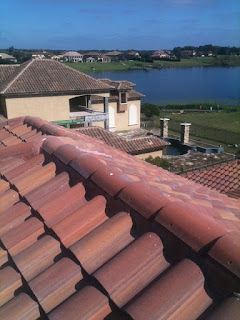
A home inspector will
perform an unbiased roof inspection. - Seal cracks. Sealing the cracks in your home’s foundation stops pests and water from intruding.
- *Have your attic professionally inspected for signs of moisture intrusion or leaking, damaged or displaced insulation, leaking or damaged HVAC duct work, damaged or displace exhaust and dryer vents, and proper ventilation.
- *Check all electrical receptacles, light switches, light fixture sockets, extension cords and appliance cords for deterioration or damage. The electrical receptacle socket should hold the cord plug securely and should have no signs of overheating/blackening or melting. Light fixtures should not flicker or have a damaged or worn socket. Damaged or worn electrical receptacles and wiring may cause a fire and should be replaced by a licensed electrician.
- Ensure
all hand rails, balusters and banisters are secured in place and do not
wobble. Baluster spacing should be
4 inches or less. Carpeting on
stairs should be secure and not worn or frayed.

Dryers - a leading cause of home fires. - Dryer ducts should be cleaned yearly or semiannually. Wall vents are usually an easy homeowner project but goose-neck roof vents require professional cleaning.
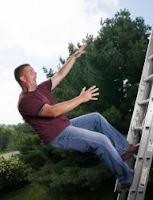 |
| Ladder Safety |
* - Tasks that require the use of a ladder or that involve electricity should be left to
a professional. Avoid tasks that you are
uncomfortable doing. Never use a ladder
or pole saw within 10 feet of a power line.
 |
Frank Carr is the Owner / Inspector at First Choice Home
Inspections in Deltona, FL serving Volusia, Seminole, Orange and Lake
Counties. Formerly in the building trades, Frank’s focus is a safe home
in the Orlando Metro and Daytona Beach areas of Central Florida and building FCHI. We believe that consumers have the right to expect
the highest standards of thoroughness, fairness and effectiveness from
their home inspector and that is exactly what we provide.
First Choice Home Inspections
Residential Home Inspections in Central Florida
(386) 624-3893
Website: http://1homeinspector.com
Twitter: https://twitter.com/1stChoiceHomeIn
